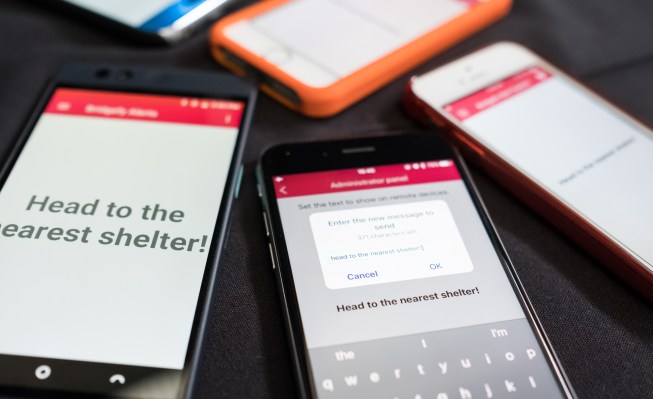Bridgefy, which is launching in our Disrupt SF Battlefield today, allows developers to build a mesh network into their mobile apps so that their users and apps can still communicate, even when those devices aren’t connected to the internet.
If that sounds oddly familiar, that’s probably because you’ve heard of Open Garden, which launched in our Battlefield in 2012 and which had an unexpected hit with its FireChat offline messaging service a few years ago. Bridgefy essentially does the same thing.
Bridgefy co-founder and CEO Jorge Rios tells me that the founders met right before a hackathon and they decided to play around with ideas “until one of us thought of making a messaging app that worked without internet.” After a long bus ride to San Antonio, the team came in second and decided to keep working on the app, but, as Rios tells me, the team quickly realized the way forward was to work on an SDK that other apps could use instead of working on a standalone product.
The Bridgefy SDK for Android and iOS, which uses Bluetooth to create its networks, allows developers to enable direct device-to-device communications that are limited by Bluetooth’s 330-foot range and to create mesh networks for delivering messages over longer distances by using other phones as intermediaries. They can also use the service to create a broadcast network that spreads messages out to all nearby users. Unlike Open Garden’s MeshKit, though, Bridgefy doesn’t look like it’s able to use one of those phones in its network as an on-ramp to the wider internet.
[gallery ids="1543211,1543210,1543212,1543208,1543205"]
What about the use cases for this? “We’re passionate about natural disaster efforts, but also education, gaming and social media,” Rios tells me. “We have learned there’s a great need for people to use apps, but can’t because they oftentimes don’t have access to internet.” The company also cites turn-based games, cruise ship apps, ride-hailing apps and check-in apps as potential use cases.
The company’s technology is currently on about 35,000 devices and Rios tells me the team is in the process of closing several contracts “that represent millions of users.” The company plans to charge app developers based on how many users engage with their apps thanks to its technology.
Open Garden has gone through some leadership changes since its launch and it’s been rather quiet around them lately — though they did launch their MeshKit SDK at MWC Barcelona earlier this year. Mesh networks like these only work when there are enough devices around that run apps that support this technology, and that’s a hard barrier to overcome outside of some special events where everybody uses the same app (think a concert or conference). If Bridgefy can overcome that, it’ll be a step ahead of the competition.
